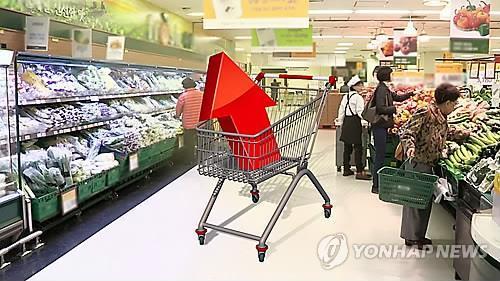South Korea's consumer prices rose more than 1 percent for the fourth consecutive month in December on high prices of fresh groceries, government data showed Friday.
The country's consumer price index rose 1.3 percent last month from a year earlier, down 0.2 percentage point from the previous month's 1.5 percent on-year gain, according to the data compiled by Statistics Korea.

The inflation has stayed over the 1 percent level since September, when it snapped the growth of less than 1 percent between May and August
From a month earlier, the index edged up 0.1 percent in December.
Core inflation, which excludes volatile oil and food prices, increased 1.2 percent compared with last year.
The statistics office said the monthly rise is largely led by high prices of foods, which have remained expensive for months due to sizzling heat and a typhoon in the summer.
Prices of agricultural products and fisheries jumped 6.7 percent this month, with those of fresh foodstuffs including vegetables and fruit soaring 12 percent from a year earlier, partly influenced by a supply shortage of eggs stemming from a severe outbreak of avian influenza.
The price index for service bills like rent and health care fees also advanced 2 percent on-year in December.
"Prices of farm products rose sharply, and rent and food service charges also grew steadily," said Woo Young-jae, director of the price statistics division at the statistical bureau. "Our survey on the prices index took place before the egg prices started to take off. We may see the rise next month."
However, prices of gasoline and electricity fell 11.5 percent from a year ago on the government's plan to lower household electricity bills by an average 11 percent.
For all of 2016, consumer prices grew 1 percent from a year earlier, slightly up from a 0.7 percent rise in 2015, but far lower than the central bank's target of 2 percent.
Prices of agricultural products rose 3.8 percent throughout the year, offsetting a 9.2-percent fall in gas and electricity prices.
The South Korean government earlier expected that the country's inflation would go up 1.6 percent next year on the back of rising oil prices. (Yonhap)
The country's consumer price index rose 1.3 percent last month from a year earlier, down 0.2 percentage point from the previous month's 1.5 percent on-year gain, according to the data compiled by Statistics Korea.

The inflation has stayed over the 1 percent level since September, when it snapped the growth of less than 1 percent between May and August
From a month earlier, the index edged up 0.1 percent in December.
Core inflation, which excludes volatile oil and food prices, increased 1.2 percent compared with last year.
The statistics office said the monthly rise is largely led by high prices of foods, which have remained expensive for months due to sizzling heat and a typhoon in the summer.
Prices of agricultural products and fisheries jumped 6.7 percent this month, with those of fresh foodstuffs including vegetables and fruit soaring 12 percent from a year earlier, partly influenced by a supply shortage of eggs stemming from a severe outbreak of avian influenza.
The price index for service bills like rent and health care fees also advanced 2 percent on-year in December.
"Prices of farm products rose sharply, and rent and food service charges also grew steadily," said Woo Young-jae, director of the price statistics division at the statistical bureau. "Our survey on the prices index took place before the egg prices started to take off. We may see the rise next month."
However, prices of gasoline and electricity fell 11.5 percent from a year ago on the government's plan to lower household electricity bills by an average 11 percent.
For all of 2016, consumer prices grew 1 percent from a year earlier, slightly up from a 0.7 percent rise in 2015, but far lower than the central bank's target of 2 percent.
Prices of agricultural products rose 3.8 percent throughout the year, offsetting a 9.2-percent fall in gas and electricity prices.
The South Korean government earlier expected that the country's inflation would go up 1.6 percent next year on the back of rising oil prices. (Yonhap)


















